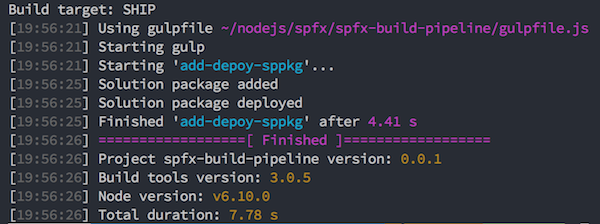SharePoint solution ALM actions
This project is created for automating the deployment process of SharePoint solution packages to the App Catalog. This module uses the new ALM APIs that are available on SharePoint Online tenants.
More information about the Application Lifecycle Management (API) can be found here: https://docs.microsoft.com/en-us/sharepoint/dev/apis/alm-api-for-spfx-add-ins
Installation
Run the following command to install the node-sp-alm:
$ npm install node-sp-alm --save-exact
Usage
Once you installed this dependency to your project. You can make use of the following provides sample to add and deploy the solution package:
const sppkg = ;const fs = ;const path = ; const fileName = "solution-package.sppkg"; const spAlm = "username": "your-username" "password": "your-password" "tenant": "your-tenant-name (ex.: contoso)" "verbose": true; // Retrieve the solution packageconst fileContent = fs;// First add the SharePoint packageconst appData = await spAlm;console;// Deploy the SharePoint package based on the package IDawait spAlmconsole;Available actions
Currently the following actions are supported:
Action: list
List returns the available apps.
spAlm.list()
// OR
spAlm.list(false)
Arguments:
- Use the tenant app catalog or site-collection app catalog (not required - default: true -> uses the tenant app catalog)
Action: appDetails
Returns information about the provided solution package ID.
spAlm.appDetails("00000000-0000-0000-0000-000000000000");
// OR
spAlm.appDetails("00000000-0000-0000-0000-000000000000", false);
Arguments:
- Package ID
- Use the tenant app catalog or site-collection app catalog (not required - default: true -> uses the tenant app catalog)
Action: add
Adds the provided solution package to the app catalog.
spAlm.add(fileName, fileContent);
// OR
spAlm.add(fileName, fileContent, true, false);
Arguments:
- File name
- File contents (Buffer)
- Overwrite file in app catalog (not required - default: true)
- Use the tenant app catalog or site-collection app catalog (not required - default: true -> uses the tenant app catalog)
Action: deploy
Deploys the previously added solution package.
deploy.deploy(pkgId, true)
// OR
deploy.deploy(pkgId, true, false)
Arguments:
- Package ID
- Skip feature deployment
- Use the tenant app catalog or site-collection app catalog (not required - default: true -> uses the tenant app catalog)
More information about the skipFeatureDeployment option can be found here: Tenant-Scoped solution deployment for SharePoint Framework solutions.
Action: retract
Retracts the solution package.
spAlm.retract(pkgId)
// OR
spAlm.retract(pkgId, false)
Arguments:
- Package ID
- Use the tenant app catalog or site-collection app catalog (not required - default: true -> uses the tenant app catalog)
Action: remove
Removed the solution package.
spAlm.remove(pkgId)
// OR
spAlm.remove(pkgId, false)
Arguments:
- Package ID
- Use the tenant app catalog or site-collection app catalog (not required - default: true -> uses the tenant app catalog)
Action: install
Installs the solution package to the site.
spAlm.install(pkgId)
Arguments:
- Package ID
Action: uninstall
Uninstalls the solution package from the site.
spAlm.uninstall(pkgId)
Arguments:
- Package ID
Action: upgrade
Upgrades the solution package on the site.
spAlm.upgrade(pkgId)
Arguments:
- Package ID
Action: getCatalogSites
Retrieve all available app catalog sites.
spAlm.getCatalogSites()
This returns the following object:
{
'odata.metadata': string;
value: [{
'odata.type': string;
'odata.id': string;
'odata.editLink': string;
AbsoluteUrl: string;
SiteID: string;
}]
}
Arguments / options
The following arguments / options can be passed for deploying the package.
username (required)
Type: String
Default: ""
Sets the username to be used for the deployment.
password (required)
Type: String
Default: ""
Sets the password to be used for the deployment.
tenant (optional)
Type: String
Default: ""
Sets the tenant name to be used for the deployment. Example: https://<tenant>.sharepoint.com
Important: You have to specify this property or the absoluteUrl property
site (optional)
Type: String
Default: ""
Specify the relative path to the app catalog site. Example: "sites/catalog"
absoluteUrl (optional)
Type: String
Default: ""
Sets the absoluteUrl to the app catalog site that needs to be used for the deployment. Example: https://tenant.sharepoint.com/sites/catalog.
Important: You have to specify this property or the combination tenant and site property.
filename (optional)
Type: Boolean
Default: false
Specify if you want to show the console logs.
Where can this be used?
This dependency can for example be used in your SharePoint Framework release process. Here is a sample gulp task that you can add to your SPFx project:
const sppkg = ;const through = ; const environmentInfo = "username": "" "password": "" "tenant": "" build;Once this task is in place, you can run it with: gulp add-deploy-sppkg or gulp add-deploy-sppkg --username "your-username" --password "your-password" --tenant "your-tenant".
More information about using arguments in SPFx gulp tasks can be found here: Passing arguments with custom Gulp tasks for SharePoint Framework projects.
Output of the task:


